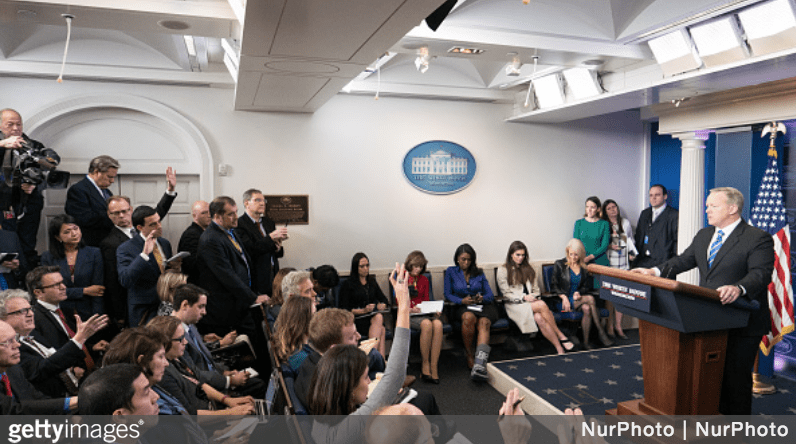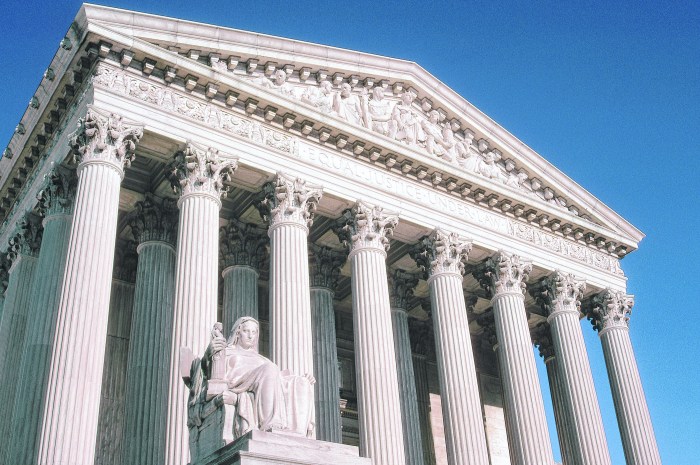The White House’s press secretary this week hinted at a hostile atmosphere toward diplomats and government workers who disagree with the new administration’s policies—a point punctuated late Monday with the firing of the country’s top law enforcement officer.
Foreign Service workers and diplomats were put on notice Monday when President Donald Trump’s press secretary, Sean Spicer, criticized the leak of a dissent memo critical of the administration’s travel ban.
The draft memo states that the temporary refugee ban and suspension of visas from seven Muslim-majority nations would only serve to alienate those countries, make America less safe, and is anathema to American values. The memo, which currently has 1,000 signatures, is still being circulated through the state department and hasn’t officially been sent to the aptly named “Dissent Channel”—the official conduit for Foreign Service employees and diplomats to voice opposing opinions on governmental policies.
Warning that the executive order signed by Trump last week would increase anti-American sentiment, the memo states: “Instead of building bridges to these societies through formal outreach and exchanges and through informal people-to-people contact, we send the message that we consider all nationals of these countries to be an unacceptable security risk.”
When asked about the release of the memo, Spicer said there’s no room for dissenting opinions.
“These career bureaucrats have a problem with it?” Spicer said. “I think they should either get with the program or they can go.”
The blunt remark could be seen as an attack on those with contrasting viewpoints, a former U.S. State Department official said.
“I think there is an implicit threat in that statement and, unfortunately, it seems like the latest example of…a series of attacks that this new administration has made against career professionals, against experts,” Jon Finer, former chief adviser to Secretary of State John Kerry, told NPR.
The White House has forcefully defended its travel ban amid protests and legal challenges across the country. Trump’s move on Friday to block refugees and temporarily halt immigration from those nations set off a firestorm of criticism and sparked a fresh wave of protests at airports across the country.
After a weekend marked by chaos at airports, where border officers were sometimes caught flatfooted and green card holders legally residing in the United States were detained or prohibited from flying to the United States, acting US Attorney General Sally Yates issued a letter to the Justice Department in defiance of Trump’s executive order.
“At present, I am not convinced that the defense of the executive order is consistent with these responsibilities, nor am I convinced that the executive order is lawful,” she wrote.
By Monday evening she was fired, and a new acting attorney general was sworn in.
Yates’ dismissal opened the administration to scrutiny after CNN circulated a video of Trump’s attorney general nominee Sen. Jeff Sessions (R-Alabama) grilling Yates during her confirmation hearing two years ago about her role in defending the Constitution.
“You have to watch out because people will be asking you to do things and you need to say no,” Sessions said. “If the views the president wants to execute are unlawful, should the attorney general or the deputy attorney general say no?”
“Senator, I believe the attorney general or the deputy attorney general has an obligation to follow the law and the Constitution and to give their independent legal advice to the president,” Yates responded. That conviction proved to be her downfall.
Spicer’s rebuke of the draft of the dissent memo and Yates’ firing came at a particularly sensitive time for the administration as it defends its controversial immigration actions.
The memo’s assessment, although incomplete, does present a worldview at odds with the current administration’s goals. However, it doesn’t shy away form offering alternative policies, including a “continuous vetting program” scrutinizing all visa holders as opposed to “specific nationalities.”
“We do not need to place a blanket ban that keeps 220 million people—men, women, and children—from entering the United States to protect our homeland. We do not need to alienate entire societies to stay safe,” the memo states. “And we do not need to sacrifice our reputation as a nation which is open and welcoming to protect our families. It is well within our reach to create a visa process which is more secure, which reflects our American values, and which would make the Department proud.”
The criticism of Foreign Service workers and diplomats using the dissent channel to express differing opinions is perhaps the most shocking because the channel is intended to be a virtual pipeline for dissenting opinions.
“Recognizing that our members are thoughtful professionals who may find themselves in honest disagreement with a policy matter or may want to share an alternative point of view, AFSA [American Foreign Service Association] encourages Foreign Service employees to utilize the Dissent Channel in expressing constructive dissent,” the office’s website states.
The Dissent Channel is managed by the Secretary’s Policy Planning Staff, which is mandated to distribute the content to State Department officials.
The agency’s policy guidelines “clearly mandates that those utilizing the Dissent Channel will not be subjected to reprisal, discipline action or unauthorized disclosure of its use,” according to the Dissent Channel’s website.
The Dissent Channel was established after the Vietnam War to improve the circulation of various opinions regarding serious policy matters.
The most recent high-profile use of the Dissent Channel was last June, when 51 State Department employees urged former President Barack Obama to order strikes against Syrian President Bashar al-Assad’s regime in his final months in office. In response, then-Secretary of State John Kerry met with some of the dissenters to hear their grievances. Like the memo critical of Trump’s immigration actions, it was also leaked.
Still, Kerry’s visit with the State Department employees is not to suggest the administration was not annoyed by the leak. Vice President Joe Biden rushed to defend the administration’s Syrian policy, saying he supported the channels by which diplomats can express contrasting viewpoints.
“But there is not a single, solitary recommendation that I saw that has a single, solitary answer attached to it—how to do what they’re talking about,” he told CBS Morning.
The channel is said to be used infrequently, and only in the most serious of cases. That such a memo was being disseminated so early in Trump’s tenure likely rubbed the White House the wrong way.
The Women’s March on Washington and sporadic protests against many of Trump’s policies—including his immigration ban—indicates a new level of public dissent in America—one that already seems to be spreading from the streets to the halls of Washington and diplomatic circles abroad.
And this White House is only 12 days old. Stay tuned.






























